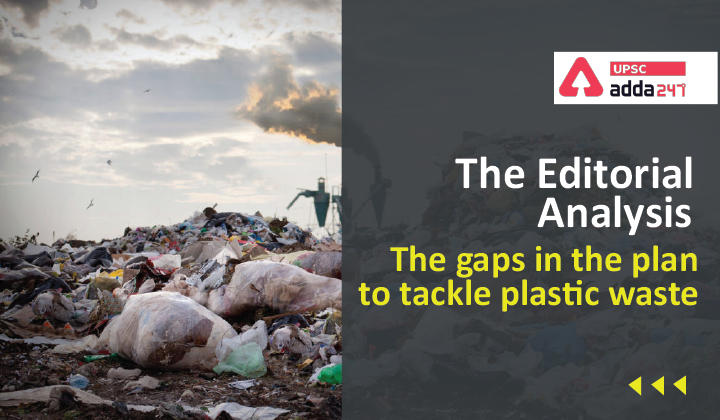Table of Contents
Draft EPR Guidelines: Relevance
- GS 3: Conservation, environmental pollution and degradation, environmental impact assessment.
Draft EPR Guidelines: Context
- The draft regulations on Extended Producer Responsibility (EPR), will come into effect by the end of 2021. These regulations, however, are criticised by the experts for being retrogressive in their approach.
Draft EPR Guidelines: What is Extended Producer Responsibility (EPR)?
- Extended Producer Responsibility (EPR) is a critical policy tool that hold manufactures accountable for their plastic products and packaging’s end-of-life impacts.
- It is a mechanism to encourage holistic eco- design in the business sector.
- For example: An FMCG company is responsible not only account for the costs of making, packing and distributing a packet of chips, but also for the collection and recycling/reuse of the packet.
EPR Guidelines India: Criticism
- Disregards the informal sector: The draft guidelines discredit the waste collectors by not mentioning
- Increase unemployment: The draft guidelines direct producers to set up a private, parallel plastic waste collection and recycling chain. It will dispossess waste pickers of their means of livelihood.
- Limited scope of EPR: The draft guidelines leave a lot of multi-material plastic items like sanitary pads, chappals, and polyester from its ambit.
- Multi-layered and multi-material plastics form the abundant type of plastic waste. These are low weight and voluminous, making them expensive to handle and transport.
- Since they are primarily used in food packaging, they often attract rodents, making storage problematic. Even if this plastic is picked, recycling is technologically challenging as it is heterogeneous material.
- The Plastic Waste Management Rules mandated the phase-out of these plastics. However, in 2018, this mandate was reversed.
- Unsustainable processing: Processes like waste-to-energy, co-processing and incineration releases carbon dioxide, particulate matter, among other harmful chemicals. They have negative impact on climate and also have health impacts.
- Moreover, technologies like chemical recycling and pyrolysis are capital-intensive, yielding low returns and running into frequent breakdowns and technological problems.
Draft EPR Guidelines: Recommendations
- People: EPR funds could be deployed for mapping and registration of the informal sector actors, building their capacity, upgrading infrastructure, promoting technology transfer, and creating closed loop feedback and monitoring mechanisms.
- Plastic: To recycle all the recyclable plastics, the government could support and strengthen the informal recycling chain by bridging gaps in adequate physical spaces, infrastructure, etc.
- The scope of plastics covered by the guidelines could be altered to exclude those plastics which are already efficiently recycled and to include other plastic and multi-material items.
- Processing: And end-of-life processing technologies should be closely evaluated, based not only on their health and environmental impacts, but also on the implications for continued production of low-quality and multi-layered plastics.
Draft EPR Guidelines: Way forward
- An effective EPR framework should address the issue of plastics and plastic waste management in tandem with the existing machinery, minimise duplication and lead to a positive environmental impact, with monitoring mechanisms including penalties for non-compliance.
Also Read:





 TSPSC Group 1 Question Paper 2024, Downl...
TSPSC Group 1 Question Paper 2024, Downl...
 TSPSC Group 1 Answer key 2024 Out, Downl...
TSPSC Group 1 Answer key 2024 Out, Downl...
 UPSC Prelims 2024 Question Paper, Downlo...
UPSC Prelims 2024 Question Paper, Downlo...
